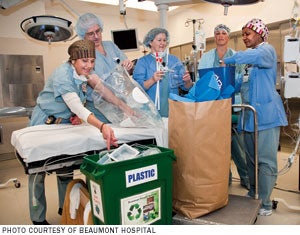Hospitals bring waste reduction to the operating room
 A perfect storm of incentives is pushing hospitals to clean up their act. It is not enough to heal individual patients, they are discovering, without considering how their actions affect the health of their communities.
A perfect storm of incentives is pushing hospitals to clean up their act. It is not enough to heal individual patients, they are discovering, without considering how their actions affect the health of their communities.
Particularly in the operating room (OR), reducing, reusing and recycling can have a huge impact in protecting the environment as well as reducing hospital costs. Reasons to trim waste output range from good public relations, to regulations, to employee demand.
"Most hospitals are nonprofit, community organizations, and communities have started stepping up to the plate," says Kai Abelkis, hospital sustainability coordinator at the two-campus Boulder (Colo.) Community Hospital, where he oversees a program that reduced waste by 40 percent annually from its 1995 level, and saves $600,000 per year.
Abelkis has found that staff members often initiate recycling programs. "It's a new generation of employees," he says. "Recycling is typical in their households. If they don't see recycling in the workplace, they speak up and ask for it."
Meanwhile, nonprofit organizations such as Practice Greenhealth encourage environmental awareness. One of Practice Greenhealth's newest members is HCA, Nashville, Tenn., which announced plans to appoint sustainability coordinators at each of its 163 hospitals.
U.S. hospitals generate 2 million tons of waste per year, says Geraldine Falacy, R.N., CNOR, at PeaceHealth, a seven-hospital system based in Bellevue, Wash., where recycling has been a long-standing practice. Falacy told the 2009 meeting of the American Society for Healthcare Environmental Services (ASHES) that reasons to minimize the amount of waste sent to landfills include cost reduction, but that it is also a factor in Joint Commission accreditation under the Environment of Care standards.
One way to reduce waste, she told them, is to reduce the use of packaging and disposable supplies. "Reducing what comes in the front door directly affects what leaves out the back door," she noted.
At first, there will be an investment in reusable products and collection bins for recycling. Obtain data, she urged, on the recycling process, costs and the resources available to accept waste. Then, recruit "champions" among physicians and OR nurses.
ASHES Executive Director Patti Costello says that communication and collaboration are critical for OR nurse and environmental services managers seeking to recycle. "You can be environmentally sustainable in the OR," she says. "But success is dependent on the culture and relationship with surgeons and anesthesiologists. Understanding each other's space, concerns and goals will go a long way in affecting sustainable outcomes."
Like Abelkis, Mark Mason found employee requests to be the driving force behind recycling. Mason is administrative director of patient and support services at Beaumont Hospital, a Troy, Mich., facility that is part of a three-hospital system in Michigan.
After fielding phone calls from employees and colleagues, Mason formed a "Green Team" in August 2008. Anyone who called him asking about recycling was invited to join the team and help plan a systemwide program.
The initial effort began on the Troy, Mich., campus, where a building expansion gave Mason the opportunity
to install a 1,500-square-foot recycling drop-off center. The hospital crushes cardboard, plastic, metal and other materials for transport to a local recycler and a national firm.
In ORs, the focus is on waste generated before the procedure, such as blue wrap and paper. "That took about 80 percent of the waste," Mason says. He is also re-educating staff on what items should not be placed in medical waste containers.
This year, he says, "we're refining our processes and getting more people involved."




